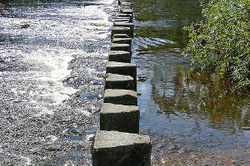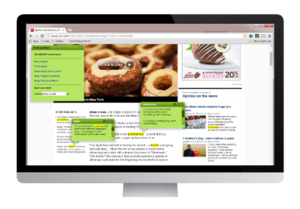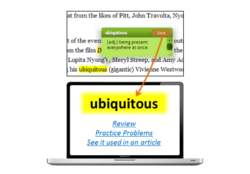Five Steps to Turning Your Ideas Into an Ed-Tech Startup
 When people find out that I’m working on an ed-tech startup, they often ask how we came up with the idea for ProfessorWord. (If you’re interested, the story is at the end of the post.) People also ask for advice on how to come up with ideas for their own ed-tech startup. I think that the most important thing is for your startup idea to be something you’re really passionate about and that you really believe in, i.e., something you’ll be willing to work on for months (maybe years), for no pay and little recognition, before it (hopefully!) pays off.
When people find out that I’m working on an ed-tech startup, they often ask how we came up with the idea for ProfessorWord. (If you’re interested, the story is at the end of the post.) People also ask for advice on how to come up with ideas for their own ed-tech startup. I think that the most important thing is for your startup idea to be something you’re really passionate about and that you really believe in, i.e., something you’ll be willing to work on for months (maybe years), for no pay and little recognition, before it (hopefully!) pays off.
Here are some easy steps to help you start generating startup ideas:
I know that sounds ridiculously basic, but it’s amazing how many great ideas you forget as you’re rushing through your day. So start documenting all the startup ideas that come to mind. Don’t know where to start? An easy way to start is by jotting down what you like or dislike about current products and solutions.
 2. Review your ideas and identify common themes
2. Review your ideas and identify common themes
Now that you have a list of ideas, the goal isn’t to pick one thing. The goal is to make connections across your ideas. Is there a clear theme? Is it obvious that you’re really interested in X or Y? Once you make those connections, brainstorm some more. What other ideas do you have within those areas?
It is 2015, so chances are someone is already attempting to implement your ideas. Don’t let that dissuade you, unless it’s Google or Facebook. It’s important to know what’s out there, so research other startups, read Education Week and EdSurge to learn about trends, and use that to help you further refine your ideas.
Now that you’ve narrowed it down to a few possible ideas, go talk to people. For example, if you’ve got a great idea for a mobile app for teachers, go talk to 10 teachers and ask them what they think. If others are excited about your idea, then it’s time to start getting excited too.
 5. Start small, but keep at it
5. Start small, but keep at it
Ask yourself what’s the smallest next step I can take? Maybe you can attend a hackathon to pitch your idea, or go to a startup fair to meet potential cofounders, or run a small experiment to test your assumptions. Whatever you do, start small, and build from there. As the saying goes: the journey of a thousand miles begins with a single step.
So what are you waiting for? Start generating those ideas!
Here’s the story of how we came up with the idea for ProfessorWord.
I am the child of immigrants. By the time I was 10 years old, I spoke English better than my parents did. Every night, as they diligently perused Time, Newsweek, or Reader’s Digest in an effort to improve their English, they would stop periodically to ask me for the definitions of the new words they encountered. Over the years, I’ve tried to modernize their approach to learning new words. Although my parents read online now, they don’t really use online dictionaries (because they don’t want to leave the page) or make a list of their words to review (because it takes too long to type them up).
 When I worked as an English teacher, I found that far too many of my students were still using old-school memorization-based techniques to try to “cram” their way to a better vocabulary. It wasn’t very effective (memorization simply doesn’t promote long-term retention) and frankly, it was pretty boring. One thing that my students did like, was reading the news articles that I found for them that used our weekly vocabulary words, because the articles were interesting and my students could see the words being used in context.
When I worked as an English teacher, I found that far too many of my students were still using old-school memorization-based techniques to try to “cram” their way to a better vocabulary. It wasn’t very effective (memorization simply doesn’t promote long-term retention) and frankly, it was pretty boring. One thing that my students did like, was reading the news articles that I found for them that used our weekly vocabulary words, because the articles were interesting and my students could see the words being used in context.
 And so, the idea for ProfessorWord was born.
And so, the idea for ProfessorWord was born.
We offer a free tool that works on any website to highlight vocabulary words and to offer one-click definitions. We’re also working to curate interesting online articles for students to read and we’re developing student and teacher accounts so students can save new words and teachers can monitor and track student progress. You can learn more in my previous post: Students Can Learn Vocabulary as They Read Online
Until next time,
See also:
- Five Tips for Ed-Tech Startups Entering Business Plan Competitions
- An Ed-Tech Entrepreneur’s Mantra: No Margin, No Mission
- Give Entrepreneurs (and Teachers) a Break!
- How to Survive (And Thrive) as an Introverted Ed-Tech Startup Entrepreneur
- Finding the Right Incubator for your Ed-Tech Startup
Have questions or feedback? Comment below or let me know on Twitter @professorword!
Photo Credit: Flickr user Tsahl Levent-Levi, Mike Linksvayer, Khalid Albalh, Nan Palmero, Jordanhill School D&T Dept, and Tim Green



